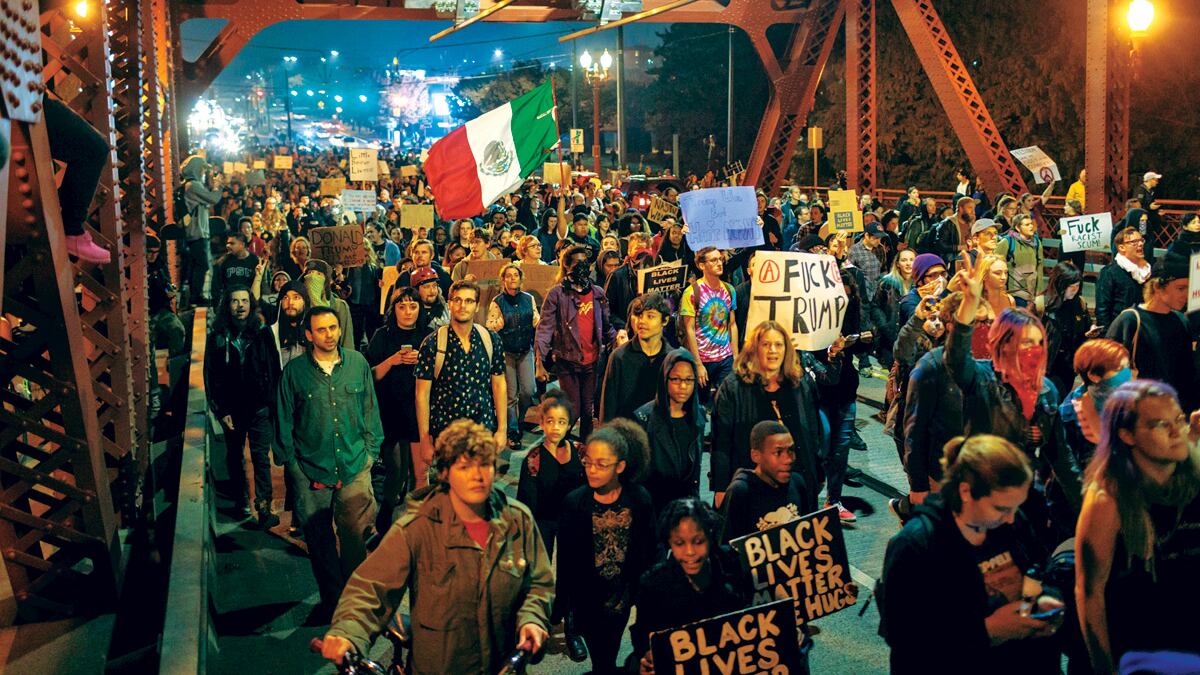Saturday, Jan. 14, was the coldest morning of a freezing week—barely above 20 degrees. Kari Koch stood in a Southeast Portland chapel with no heat. She looked into a crowd of nearly 300 shivering activists.
"This may sound kind of crass," Koch told the crowd, "but I actually feel hopeful right now."
A ripple of laughter rolled through the crowd. At the start of 2017, sometimes mere cheerfulness can feel like a radical act.
Koch, a 15-year veteran of Portland social justice protests, was one of the speakers at a daylong training seminar for activists planning to protest Donald Trump's presidency on inauguration weekend and beyond. RSVPs for the event topped 250 people; despite a foot of snow, even more showed up.
Related: Kat Stevens is organizing Portland's anti-Trump protests. Here's what she's bringing.
The workshops inside Sunnyside Community House, a block off Southeast Belmont Street, were led by a dozen activist groups that advocate for racial equality, LGBTQ rights, environmental protections, accessible health care, and social responsibility. The topics ranged from tips on social media to protest songwriting to how to use bicycles to support marches.
Starting tonight, the people who huddled in the chapel will be taking to Portland streets, halting traffic and chanting their objections to the next president. They believe their actions will provide a bulwark against the Trump administration: If the nation sees that not everyone is acquiescing to Trump, it will be emboldened to join in the defiance.
"History books will talk about the resistance, not the guy stuck in traffic," said Gregory McKelvey, a protest organizer who has become one of the most recognizable street activists in Portland.
But Jan. 14, the emphasis was on the practical. Protest organizers want to change the world. But they also want their allies to be peaceful and careful.
"Confronting state power can be scary," says Mia Reback, a staff organizer for 350PDX, an advocacy group opposed to climate change. "But we're more powerful together."
Reback and event emcee Adriane Ackerman sat down with WW after the opening panel to share advice on how people can protest Trump and get home safe.
They aren't the only ones with tips: Public defender Chris O'Connor offered his list in this week's Portland Mercury, and it's also worth a read.
Here are eight of the suggestions we garnered from veteran activists.
1. Don't go alone.
Remember the buddy system from elementary school? Now's the time to bring it back. Even if you're part of a larger group, pair up and don't leave your buddy behind. "Go together, move together," advises Reback.
2. Know your limits.
Why are you marching? To advocate for a specific cause? To network with other protesters and organizations? Just want to scream colorful chants at Donald Trump with thousands of other people? "That's fine!" says Ackerman. "Just know it." Knowing why you're going also means knowing how far you'll go. How far can you walk? Are you willing to be arrested?
3. Know your rights.
Before heading out, brush up on your rights as a protester. The Fifth Amendment of the U.S. Constitution gives every person the right to remain silent when questioned by a police officer or government agent. The Fourth Amendment says that individuals cannot be searched without a warrant or their consent—if you do not consent to a search, say so. The Civil Liberties Defense Center is a good online resource to get more details.
4. Write important phone numbers on your arm.
You'll be glad you did if your phone dies, or gets taken from you by police. A good number to have among friends and family: 503-902-5340, the legal support hotline for the Portland chapter of the National Lawyers Guild.
5. Pack your protest bag and dress smart.
Do bring water, energy snacks, your meds, a bandanna and goggles in case of tear gas—swim goggles actually work great. Do not bring drugs, weapons or anything else you wouldn't want found if you're taken into custody. Do wear clothing in layers and comfortable walking shoes. Do not wear contact lenses or anything oil-based on your skin—both can trap irritating chemicals.
6. Look for medics, peacekeepers and legal observers.
Street medics wear red duct tape crosses, legal observers from the National Lawyers Guild wear bright green hats, and many organizations will have designated peacekeepers wearing distinct and visible colors. These people are trained and there to help if you or someone else needs assistance.
7. Don't talk to the cops.
"At present, their role is to use force to protect the status quo," says Reback. "Until that changes, just do not engage with them." Instead, organizers say to talk to the trained liaisons: peacekeepers and legal observers from the National Lawyers Guild. The Portland Police Bureau, as you might expect, disagrees with this advice. "Our preference would always be that people talk to us, and cooperate with law enforcement," says the bureau spokesman, Sgt. Pete Simpson. (The PPB's top advice, by the way: Don't destroy property.)
8. Don't forget who your friends are.
Sometimes you may disagree with people, but resist getting bogged down in infighting, and don't publicly disagree with other protesters on the street. "This is one moment in time that will have great significance," says Ackerman. "Think about where you're directing your energy, and remember who the enemy is."
